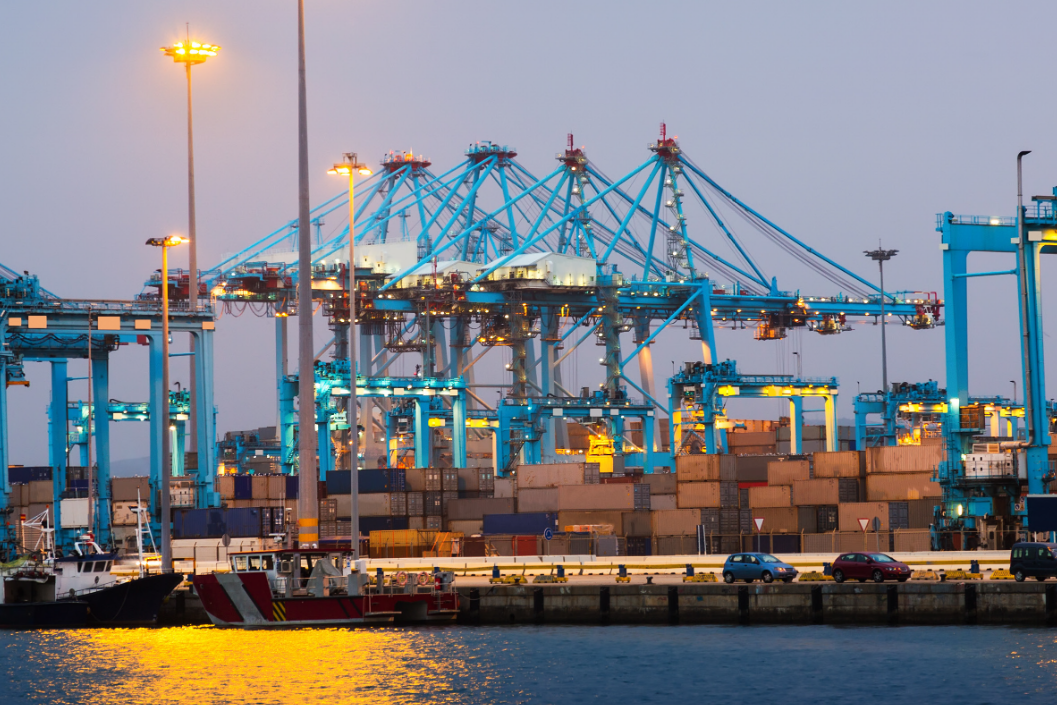Container terminals are living ecosystems built over complex and large infrastructures with a significant number of parties interacting in a coordinated way to offer highly complex logistic services under strict operational planning and tight cost controls.
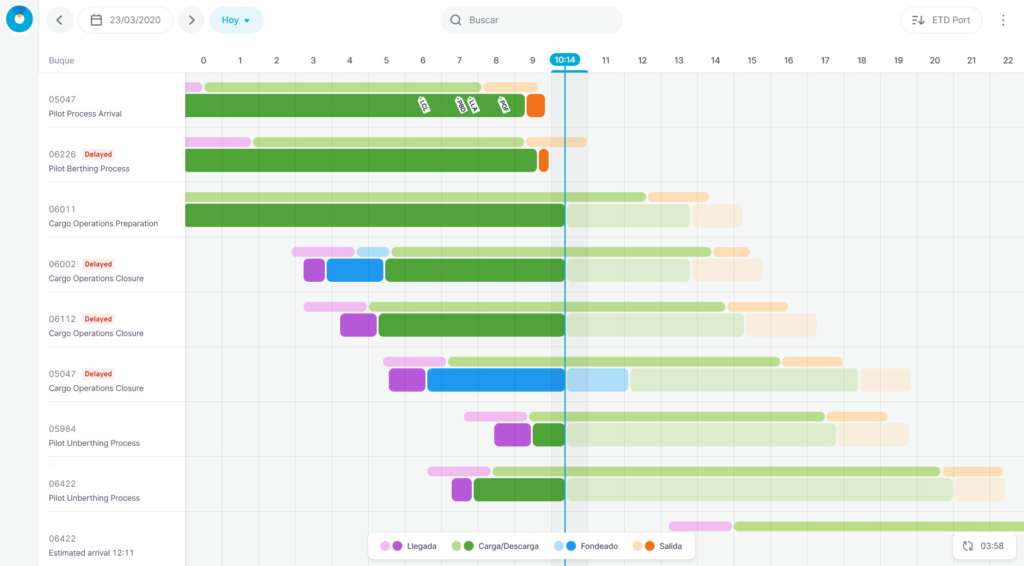 Due to the port and shipping industry’s competitiveness, challenging requirements and demanding needs, port operations must be carried out in a very accurate manner to achieve high operational efficiency, while also ensuring safety. Port efficiency is typically characterised by maximising terminal cargo operations productivity rates and minimising holistic idle time during the end-to-end port call process.
Due to the port and shipping industry’s competitiveness, challenging requirements and demanding needs, port operations must be carried out in a very accurate manner to achieve high operational efficiency, while also ensuring safety. Port efficiency is typically characterised by maximising terminal cargo operations productivity rates and minimising holistic idle time during the end-to-end port call process.
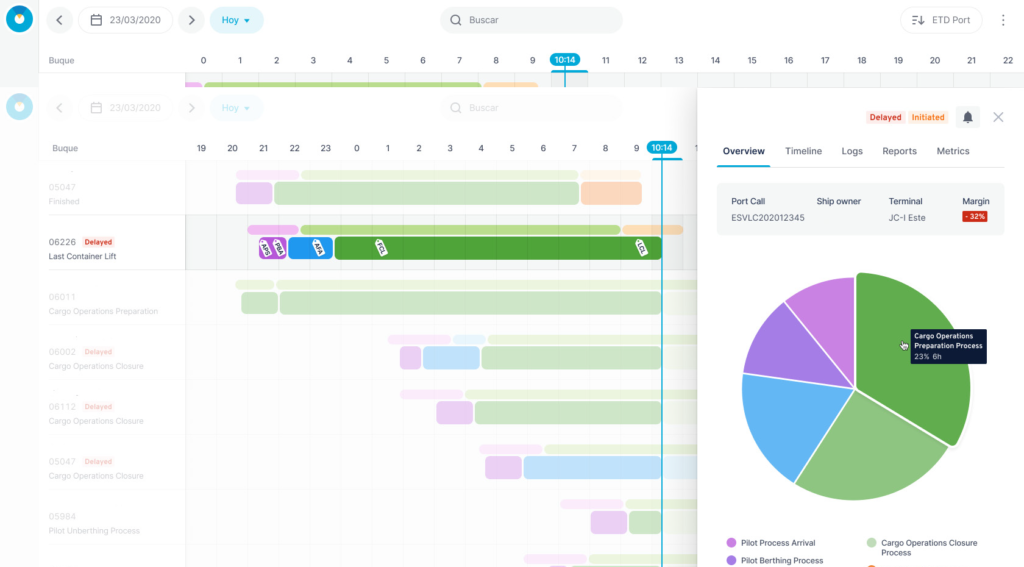 Whilst maritime transport is playing a key role during the COVID-19 global pandemic, ensuring the non-stop delivery of basic products and health goods around the world, COVID-19 is also having a strong economic impact not only on port operations, but also on the entire maritime transport business.
Whilst maritime transport is playing a key role during the COVID-19 global pandemic, ensuring the non-stop delivery of basic products and health goods around the world, COVID-19 is also having a strong economic impact not only on port operations, but also on the entire maritime transport business.
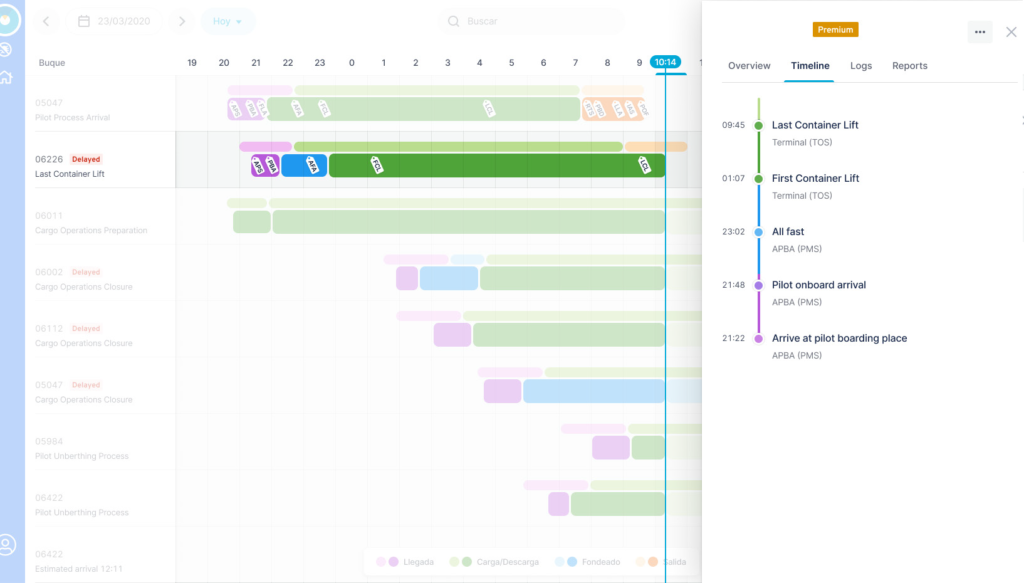 For example, in Spain, 4.9 million tons less were moved in April 2020, representing a 10% fall; both conventional and container cargo has fallen by 10.9% and 4.6%, respectively. This has resulted in an overall decrease of 6.4% in cargo operations when comparing the same indicators during the same period in 2019. This according to a report by the Spanish Government and Puertos del Estado published in June 2020 which highlights that general interest ports moved 174.8 million tons during the first four months of the year.
For example, in Spain, 4.9 million tons less were moved in April 2020, representing a 10% fall; both conventional and container cargo has fallen by 10.9% and 4.6%, respectively. This has resulted in an overall decrease of 6.4% in cargo operations when comparing the same indicators during the same period in 2019. This according to a report by the Spanish Government and Puertos del Estado published in June 2020 which highlights that general interest ports moved 174.8 million tons during the first four months of the year.
While it is true that this worldwide health crisis is not affecting all nations in the same way, it is also true that global trade and the whole shipping industry is adapting actual operational processes, business rules and ICT tools to what is being dubbed by media the New Normal or the 1.5 meters economy. It is generally expected that social distancing and other prevention measures will remain for a long period of time. Much has been said about resilience, flexibility and efficiency of global supply chains. Therefore, one of the highest priorities of logistics providers, and Port Authorities in particular, is to try to adapt their local needs, processes and working conditions to the current climate and conditions which are undoubtedly different from pre-COVID conditions.
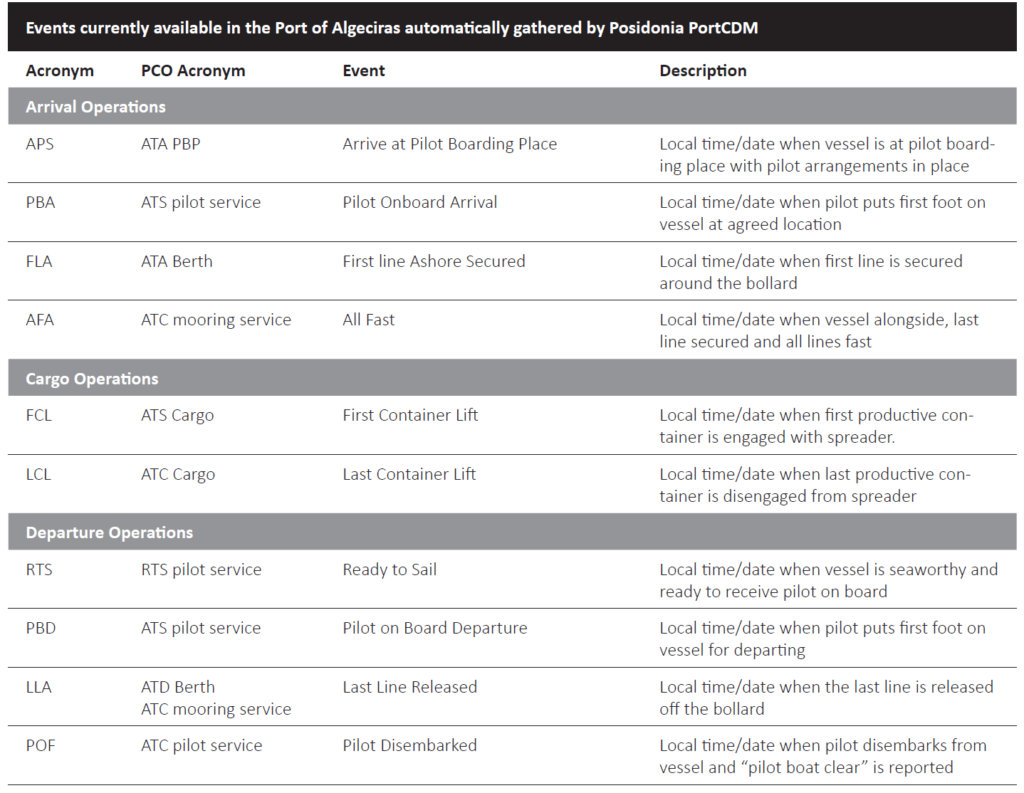 Algeciras Port Authority (APBA) is a good example of an entity which is continuously looking for innovative solutions which will enable nations to resume business and reopen their economies without assuming health risks, and carrying out their duties in the safest and most performing possible way.
Algeciras Port Authority (APBA) is a good example of an entity which is continuously looking for innovative solutions which will enable nations to resume business and reopen their economies without assuming health risks, and carrying out their duties in the safest and most performing possible way.
YOU CANNOT MANAGE WHAT YOU CANNOT MEASURE
APBA, in collaboration with its technological partner Prodevelop, has been working on the development of a Port Collaborative Decision Making product (Posidonia PortCDM) that aims to optimize Port Calls through the promotion of a common understanding and data sharing among all parties involved to improve operational coordination and to make the maritime supply chain greener due to a reduction of fuel consumption and unnecessary waiting times.
According to the feedback provided by end-users, on one hand what they appreciate the most is the opportunity to be able to follow end-to-end how a Port Call is progressing, in real-time, to have situational awareness and be able to react as soon as possible in case of operational disruptions. On the other hand, accurate forecast of operational events (Estimated Time of Arrival/Cargo Completion/Departure, etc.) are needed to coordinate and optimize resources.
Besides that, Posidonia PortCDM was conceived bearing in mind the opportunity to put a situational awareness system, which could increase efficiency, reliability, confidence and safety while reducing costs, idle times, waste of resources and inefficiencies, at the disposal of all the actors involved in the operational process.
Furthermore, this is also a good opportunity to create a culture of continuous improvement in the Port Community of Algeciras, led by its Port Authority, making an operational change that drives and returns measurable value possible.
Specifically, Posidonia PortCDM estimates the most important key performance indicators available during the different stages, which makes up the whole cycle of a Port Call (i.e. arrival at pilot boarding place, berthing process, cargo operations preparation, cargo operations execution, cargo operations closure process, etc.), and compares estimated and actual timeframes. Last but not least, a Port Call Process could not be improved or optimized if an agreement between all the different involved parties (shipping lines, ship agents, Port Authorities, terminals, pilots, linesmen, etc.) is not reached first.
 One of the strengths of Posidona PortCDM is that it has been elaborated taking advanEventstage of the International standards, contracts and International Maritime Organization resolutions, which apply to any Port and Trade around the world dictated by the International Taskforce Port Call Optimization Group (PCO) where APBA has been an active partner since the beginning. The deliverables, recommendations and outcomes from the PCO are not an option in a global port and maritime industry, but mandatory in order to ensure the acceptance and understanding of high volumes of diverse data coming from distributed and heterogeneous sources of information.
One of the strengths of Posidona PortCDM is that it has been elaborated taking advanEventstage of the International standards, contracts and International Maritime Organization resolutions, which apply to any Port and Trade around the world dictated by the International Taskforce Port Call Optimization Group (PCO) where APBA has been an active partner since the beginning. The deliverables, recommendations and outcomes from the PCO are not an option in a global port and maritime industry, but mandatory in order to ensure the acceptance and understanding of high volumes of diverse data coming from distributed and heterogeneous sources of information.
IF YOU CANNOT MEASURE IT, YOU CANNOT IMPROVE IT (AND WHAT IS NOT IMPROVED IS ALWAYS DEAD)
Unfortunately, the appearance of worldwide crisis like COVID-19 produces a change in our scale of values and priorities. It is becoming clear that concepts and features that were not so important in the past are now fundamental and mandatory not only for the staff but also for the business. The New Normal demands us certain protection measures as citizens like social distancing in order to protect ourselves and avoid spread the virus.
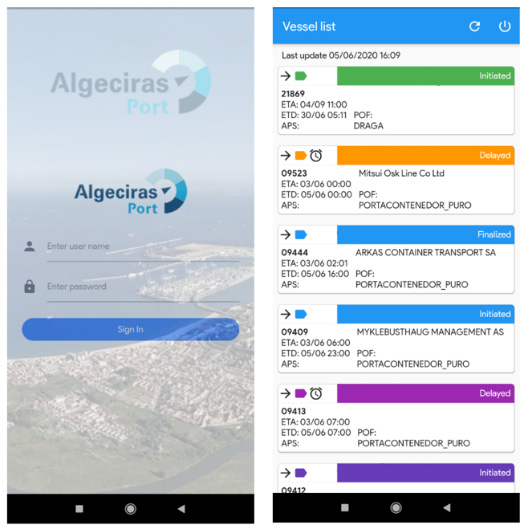
In conclusion, Algeciras Port Authority, in collaboration with Prodevelop, has been intensively working on the deployment of a cloud-based and environmentally friendly solution which is already up and running in the live environment. It enables the Port Community to improve the management of cargo operations through the optimization of their operational processes with a collaborative approach. Limit close contact with others and staying away does not mean remain isolated. In fact, it is imperative to promote new initiatives like Posidonia PortCDM which will enable the staff and parties to stay connected while keeping them safe and protected, especially because working from home is not always an option in the maritime sector. In the same way that flattening the curve has required us to work collaboratively as a society, it is key in order to retaining customers and generate new business opportunities in the Port Industry to align criteria and work towards a common global goal: the collaborative data sharing is essential and will improve the operational excellence of Ports, as well as the quality of the service(s) they bring, while increasing the competitiveness and reliability.
The partnership between the Algeciras Port Authority and Prodevelop is a real example that demonstrates how it is possible to optimize and improve the overall performance of the Port Community without making a major investment in new and expensive infrastructure which is not always affordable for all.
NOTE: The names of the vessels have been digitally removed from the actual screenshots of the solution for data protection purposes.
More Info About PosidonaCDM
ABOUT THE AUTHORS
Ángel Martínez Cavero is a telecom engineer and PhD student. He is a Product Manager at Prodevelop where he has the opportunity to validate new business models as well as to build solid and innovative technological ICT solutions in order to improve performance, user experience and RoI of industrial partners.
Dr. Francisco de los Santos is Chief Information and Innovation Officer at Algeciras Port Authority. His main responsibility is to lead the digital transformation of Algeciras Port and consolidate Innovation as a core business process. He holds an MSc in Civil Engineering, an Executive Master in Telecom Management and IT, a PhD in Port Engineering, and an Executive MBA from IESE Business School.
Jesús Medina Blanco is IT Business Relationship and Innovation Manager at Algeciras Port Authority. His duty is to foster the relationship between the IT department and the rest of the Port Authority’s departments. He oversees aligning business engagement and strategic demand management with IT and innovation strategy.
ABOUT THE ORGANIZATIONS
Prodevelop is a 25-year experience company highly specialized in ICT solutions for the maritime industry, which prides itself on its ability to offer innovative and flexible solutions, specially designed to meet the requirements of port authorities and terminals. It offers comprehensive port information system platforms and terminal optimization through automation.
Algeciras Port Authority, located at the Strait of Gibraltar, is the first Spanish and fourth European port in terms of total cargo. With more than 110,000 ships/year crossing the Strait of Gibraltar and 7,500 ha of deep and sheltered waters, Algeciras is promoting a one-stop-shop port concept for vessel services (bunkering, repairs, ship supplies and others).
ENQUIRIES
- Ángel Martínez Cavero (Prodevelop): amartinez@prodevelop.es
- Algeciras Port Authority: desarrollotecnologico@apba.es
PUBLISHED
This article has been published at Port Technology e-Journal (https://www.porttechnology.org/editions/automation-innovations/)
